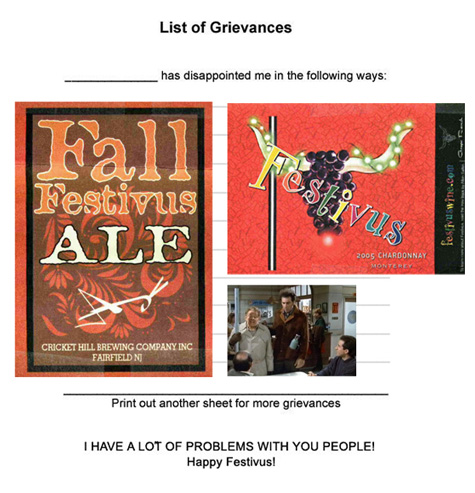There are lots of Santa labels of late, but this one got our attention because it combines many relevant elements in one small place. First, it is elderberry wine, and that’s fairly unusual. Second, it’s made in South Dakota, and that’s not so common. And then there is Santa. We don’t remember seeing so very many Santa Claus labels in past years. This may be because a great many states prohibit references to Santa on alcohol beverage products. The Wine Institute still discourages it, at least in wine ads.
Continue Reading Leave a CommentAss Kisser Chardonnay

Thanks to Barry Strike for bringing this label and controversy to our attention. Barry is a lawyer at Hinman & Carmichael in San Francisco, where he has practiced wine and beverage law for many years. Barry explained:
Continue Reading Leave a CommentIn mid-2008, TTB approved four wine labels with the brand name above. The wines are made in Australia and imported by Rocland Wine Imports, of California. Either TTB is developing a sense of humor or the examiner is an ardent animal lover. (Or perhaps the examiner thought this was an animal husbandry reference?) In any case, this is a good example of TTB’s approval of a label with a brand name that likely would have been regarded as profane a few years ago. Notwithstanding TTB’s apparent embrace of humorous, daring labels, some state regulators are not as enlightened. The state of Michigan recently refused to allow Big Ass brand wine to be sold in the state. Lacking any applicable regulatory or statutory basis for disapproving the label, the state claimed it was racist(?!). The Big-Ass Coalition must have applauded the state’s bold step to protect big asses everywhere.
Festivus Libations

And a Happy Festivus to all. Let the AOG commence!
FRANK: Welcome, new comers. The tradition of Festivus begins with the airing of grievances. I got a lot of problems with you people! And now you’re gonna hear about it! You, Kruger. My son tells me your company stinks! GEORGE: Oh, God.
Festivus is a secular holiday alternative to Christmas, Hanukkah, and Kwanzaa, popularized in the December 18, 1997 episode of Seinfeld, The Strike. It is celebrated December 23rd. The Ale is from Cricket Hill of New Jersey and the wine (above) is from Pecan Ridge of Oklahoma.
Continue Reading Leave a CommentTags: current events, famous
Sparks and Caffeine: Nearly Extinguished

Sparks is all but dead. Today 13 Attorneys General announced a settlement with MillerCoors. The settlement covers this well-known brand of malt beverage with caffeine, taurine, guarana, ginseng — and essentially removes it from the US market. The old label, in use from about 2001 until today, is on the left side above. The new label is on the right. The battery symbols, caffeine (and other ingredients) are banished. The settlement calls for MillerCoors to reformulate Sparks and change the labels within three weeks. It also requires MillerCoors to pay $550,000 in fees within five days. Upon announcing the settlement earlier today, Connecticut Attorney General Richard Blumenthal said:
“Sparks is an insidious and insane drink that deservedly now is down the drain — like all stimulant-spiked alcoholic drinks should be,” Blumenthal said. “Beverages like Sparks are a witch’s brew of alcohol and caffeine, energizing drunks and encouraging dangerous, even deadly behavior. Common sense says a drink impairing judgment while conferring excess energy is a very bad idea. Studies show that these drinks lead to binge drinking, car crashes, sexual assaults and other risky behavior. They impair reactions and reasoning, but instill the illusion of alertness and energy.”
The settlement is so far-reaching, it even includes newer MillerCoors products such as Rize.
Continue Reading Leave a CommentGreen Gin, Green Shiraz

Red Deer wine claims to be “Tree Free.” We could only guess that this means the labels are made from rice, or something other than trees. But no. The UPC label explains that the wine is “Untouched by oak – The ‘naturelle’ fruit characters of the wine are not overwhelmed by additives commonly introduced by man – LIKE OAK.” We are getting the impression they don’t like oak. The label says the producer is part of a sustainable resource initiative. It also refers to the “Intense body,” and TTB often disallows “intense” on table wines (where it suggests a high alcohol content). In other green beverages, Rainforest Gin claims it “Saves the Rain Forest with Every Bottle.” Of gin. Made in Cleveland.
Continue Reading Leave a CommentTags: organic/vegan/green, policy


